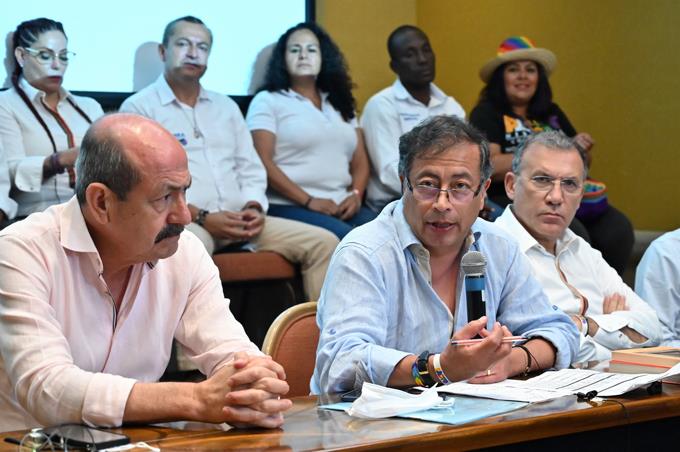An unpopular government, with a president criticized even by his co-partisans, threatens the aspirations of the right to retain power and cause a historic upheaval in Colombia.
With three months remaining for the May 29 election, former guerrilla Gustavo Petro is headed for victory in a country historically ruled by the right, polls and analysts say.
Petro has consolidated his campaign on the worn-out figure of Iván Duque, who will end his four-year term in August, sinking in the polls. Only 20% of Colombians support his management, according to the firm Invamer.
The right, supported by former president Álvaro Uribe (2002-2010), who catapulted Duque, lives a "wear and tear" and "does not have the gasoline to carry a candidate to the end" without making alliances, estimates Mauricio Reyes, from the Department of Law and Political Science of the state National University.
In a country further impoverished by the pandemic "the devastation is so great, or they feel it that way, that there are people willing to vote for the left"according to Fernando Giraldo, professor at the Universidad del Rosario.
On March 13, the electoral battle will begin with the legislative elections and the primaries. A coalition of leftist forces and dissidents from other parties will invest Petro as their candidate.
mark distance
Unlike his predecessors Uribe and Juan Manuel Santos (2010-2018), Duque will not be able to seek re-election for a constitutional reform. But even if he could run, no one would bet on his candidacy, observers say.
is a president "to which the whole world separates him; it’s a wounded duck that everyone shoots"graph Kings.
Even the radical wing of the Democratic Center distanced itself. Cambio magazine released an audio of Senator María Fernanda Cabal in which she is heard saying that Uribe himself "it tasted like shit" Duke’s government.
"There is an internal rupture due to policies that within his party were considered that (the president) did not defend"Reyes adds.
Duque, 45, came to power in 2018 at the hands of Uribe and promising a tough hand with the violent and drug traffickers, an austere state and in favor of the free market. In addition, he unsuccessfully launched to reform the 2016 peace agreement with the former FARC guerrilla. But he was met with massive protests.
In 2021, it exceeded the disapproval record (76%) since 1998. The pandemic, which impoverished 42.5% of the 50 million Colombians, threw hundreds of thousands into the streets who demanded a more supportive State and were brutally repressed.
With decisions like that "two-thirds of society was thrown on"estimates Giraldo.
Uribe and his supporters arrive "with heavy wear"complements Andrés Dávila, professor of Political Science at the Javeriana University.
Despite being the most relevant leader of the century, the former president is "worn, aged" and entangled with a judicial investigation for alleged witness tampering, he adds.
This time, the Democratic Center chose former minister Óscar Iván Zuluaga, a loyal Uribe supporter, to fight for the presidency, but his name did not take off in the polls and analysts agree in highlighting his lack of charisma.
left up
Petro, on the other hand, is the absolute leader in the polls. The 61-year-old former guerrilla, who embodies change and promises to break with neoliberalism, fills public squares, is very active on social networks and rides on the government’s mistakes.
According to Invamer, 42% of Colombians would vote for the senator, who lost the ballot to Duque in 2018.
Petro is a figure "overwhelming"what, today "does not have a clear political opponent"Giraldo points out. In addition, he adds, he has been able to capitalize on the citizen’s desire for reform, after a long tradition of liberal or conservative governments.
Can "that it be the first (time) that in Colombia at the national level, in the presidential election and in the legislative ones, there is a change (…) of government, of style and even of proposals"anticipate.
While the forces opposed to Petro are still fighting for the nomination of their candidates, Petro "started the campaign in September of last year directly"and took an early lead, complements Reyes.
Although he warns that the long proselytism can also tire the electorate, especially when Petro continues"playing it to be polarizing".
In 2018 it was "all against Petro (…) what remains is to know who will be the Duke of 2022"says Davila.
A coalition of center moderates presents itself as an alternative between the extremes, but it is divided by accusations of corruption among its own members. Except for one extraordinary twist, all roads lead to Petro.
